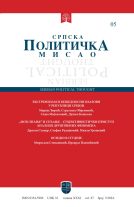- Home page
- Researchers
- Slobodan M. Radojević
Slobodan M. Radojević
Vojna akademija, Univerzitet odbrane u Beogradu

DEFENSE POLICY BASED ON THE CONCEPT OF TOTAL DEFENCE
Total defence is a concept that should ensure the response of the state in situations caused by war and other extraordinary circumstances. This comprehensive approach of the state system's response requires that all segments of society as a whole actively act in order to preserve the sovereignty and security of the state.
In order for a society to be able to respond positively to threats, challenges and risks, it is necessary that the strategy of deterrence be based on the concept of total defence. The historical beginnings of the establishment of the concept of total defence go back to the period after the Second World War, while the development of the concept intensified during the Cold War.
The mentioned periods are characterized by an increase in the fear of aggression and potential occupation, which predicted that states would strengthen their own readiness for defence.
The aim of this paper is to present, based on the experiences and examples of other countries, lessons learned that could be used to build the concept of total defense in the Republic of Serbia.
The authors, finding important features of the application of the concept of total defense in countries around the world, tried to provide important lessons for strengthening military neutrality and building the concept of total defense of the Republic of Serbia.

NATIONAL INTEREST OF THE REPUBLIC OF SERBIA FOR PARTICIPATION OF SERBIAN ARMED FORCES IN PEACEKEEPING OPERATIONS
Peacekeeping operations are one of the instruments for resolving crises in the world and preventing armed conflicts that threaten global peace and security. This article argues that the participation of the Serbian Armed Forces in UN missions contributed to peacekeeping in the world and produced positive benefits for the country. Namely, the Serbian Armed Forces inherits the tradition of many years of participation in UN and EU peacekeeping operations. This article first provides an overview of the most important contributions of the Republic of Serbia to peacekeeping operations, focusing on the important role that this activity plays in the achievement of foreign policy goals, national development and international relations. This is followed by the presentation of national legislation that regulates the Serbian Armed Forces participation in peacekeeping operations. Therefore, peacekeeping operations are recognized as a type of multilateral mechanism for achieving cooperation between the Republic of Serbia and the UN/EU and a contribution to building trust and the position of a reliable partner in international relations. The theory of international relations that explains such actions of states is the realism theory. In accordance with realists school of thought, state national interests for participation in peacekeeping operations are military security issues, national and strategic interests as well as economic interests, and increased credibility and power of states in international relations. Starting from the fact that global security is comprehensive and indivisible, states are even more interested in participating in peacekeeping operations and perceive it as their national interests and an element of foreign and security policy. This is the initial thesis from which the authors base their analysis presented in the paper.
